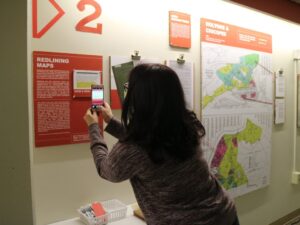Synopsis

Undesign the Redline @ Barnard is an interactive exhibition that combines history, art, and storytelling with community outreach and collaboration, in order to reckon with systemic racism through an exploration of the legacy of redlining in Barnard and Columbia’s neighborhood. Undesign the Redline will present the national and local history of redlining practices through a custom-designed exhibition made up of primary and secondary sources, student and community contributions, and multi-media narratives spanning the decades since the creation of redlined maps by the Home Owners’ Loan Corporation (HOLC) in 1938 through to the present. Working with a local New York-based social design studio Designing the WE, both internal and external stakeholders in Barnard’s upper Manhattan neighborhoods such as faculty, students, and unaffiliated community members will co-create an exhibition that recounts the historical roots of redlining in Morningside Heights and Harlem as well as its contemporary legacies.
Undesign the Redline provides a unique opportunity to examine how the “othering” of entire demographics manifests spatially in the development and evolution of neighborhoods and cities. The fundamental premise of redlining, that one group is more valuable and deserving of resources than another, did not begin with lines drawn on maps. It has deep roots in a slavery-based economy that stratified roles based on race. Redlining formalized this practice across the built environments in US cities.
To undesign the redline is to challenge this systemic inequality through a transformational approach, starting with a fundamental shift in the way we think. Through Undesign the Redline, the extended Columbia community will have the opportunity to engage critically with a form of structural racism that shapes the neighborhoods and cities where we live, work and play.
Timeline
Fall 2020 – Spring 2021: Undesign Public Reading Group
Summer Humanities Lab and Faculty Seminar
Fall 2021: Exhibition Opening
Collaborators
Undesign has drawn together faculty, staff, and students from across the university as well as collaborators from the larger community. Our core planning committee includes:
- Ariana Allensworth, artist and Founding Member of Anti-Eviction Mapping Project
- Logan Brenner, Assistant Professor, Environmental Science
- Zakiya Collier, Digital Archivist at the Schomburg Center for Research in Black Culture, The New York Public Library
- Elizabeth Cook, Assistant Professor, Department of Environmental Science, Barnard College
- Jennie Correia, Research & Instruction Librarian for the Social Sciences and Interim Associate Director of Teaching, Learning and Digital Scholarship
- April De Simone, Co-Founder of Designing the WE
- Kaiama L. Glover, Ann Whitney Olin Professor of French and Africana Studies and Faculty Director, Digital Humanities Center
- Anne Janowski (BC ’23) History and Anthropology
- Fatima Zohra Koli, Associate Director of the Empirical Reasoning Center (BLAIS)
- Ana Lam, Post-Baccalaureate Fellow in the Digital Humanities
- Daniela Lebron (BC ’22) American Studies and Political Science
- Mikako Murphy (BC ’22) Urban Studies
- Vani Natarajan, Research and Instruction Librarian in the Humanities and Global Studies
- Miriam Neptune, Interim Co-Dean of Barnard Library & Academic Information Services (BLAIS)
- Michael Partis, Executive Director of Bronx Cooperative Development Initiative
- Alicia Peaker, Digital Scholarship Librarian (BLAIS)
- Alex Pittman, Associate Director, Center for Engaged Pedagogy
- Pamela Phillips, Senior Program Assistant, Barnard Center for Research on Women (BCRW) and founder/creator, Changing the Narrative
- Mary Rocco, Term Assistant Professor of Urban Studies
- Jennifer Rosales, Executive Director of the Center for Engaged Pedagogy
- Angela Simms, Assistant Professor, Sociology and Urban Studies
- Mariame Sissoko (BC ’24) Undecided
- Martha Tenney, Director of the Barnard Archives & Special Collections
- Vanessa Thill (BC ‘13) housing organizer, Milstein Center Exhibits Designer
- Annabelle Tseng, Graduate Assistant for the Center for Engaged Pedagogy
- Saraly Vargas (BC ’21), Sociology
- Meredith Wisner, Research & Instruction Librarian for Anthropology, Art & Architecture
With special thanks to: - Shirley Taylor, Director of Education at the Apollo Theater
- Cammie Jones, Executive Director of Community Engagement and Inclusion, Barnard College
How to get involved
Write to vthill@barnard.edu to be added to our listserv. Contribute to the #Undesign syllabus. Check out past reading group sessions. Stay tuned for the opening of the exhibition, and future events on campus this fall.
This program is funded by Barnard Library and Academic Information Services, Barnard Engages, Barnard Center for Research on Women, a grant from Humanities New York with support from the National Endowment for the Humanities, and an Addressing Racism Seed Grant from the Trustees of Columbia University. Co-sponsors include: Barnard Digital Humanities Center, the Center for Engaged Pedagogy, and the Barnard–Columbia Urban Studies Program.